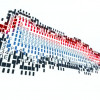New German passport to contain contactless secure chips
The German government is using highly secure chips developed by Munich-based semiconductor manufacturer Infineon Technologies AG. This is an effort to make counterfeiting and unauthorized use virtually impossible in future electronic passports, which the German Passport Office intends to issue as of November 2005.
Infineon will also be supplying a special chip package developed for identity cards and passports as well as the inlay containing the antenna and its connection to the chip. There are currently around 24 million German passports in circulation, which are usually valid for ten years, with an annual replacement and renewal rate of about 10%.
In the new electronic passport, the printed information about the bearer's identity - such as the bearer's name, date of birth, and photo, and the passport's validity period and number - will also be stored encrypted on a chip. And, starting no later than March 2007, fingerprints of each of the bearer's index fingers will also be stored in encrypted form. Current plans call for the chip to be invisibly integrated into the front cover.
The German company "Bundesdruckerei" will be producing the passports and providing the necessary infrastructure including the background system and reading devices, etc. Infineon is one of the two semiconductor suppliers for the German passport.









































































